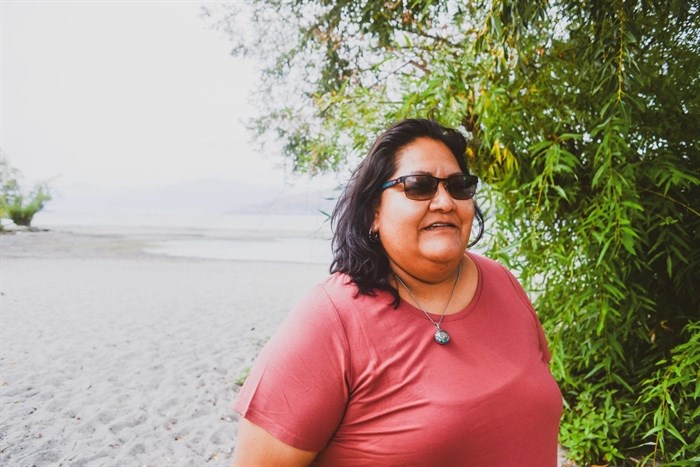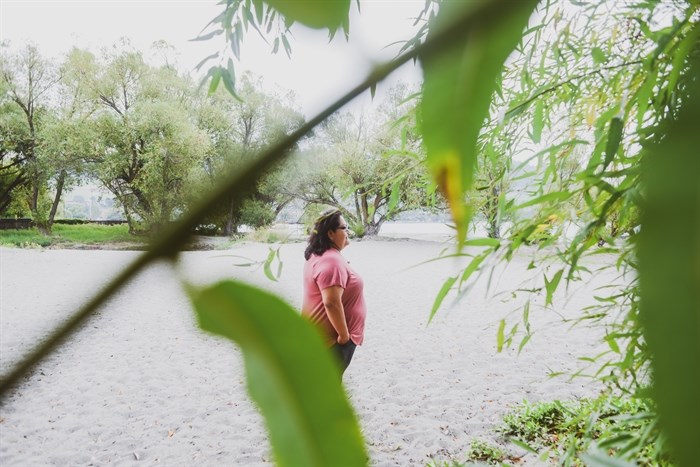
Jayna Pooley says she’s battling survivor’s guilt upon returning home after wildfire devastated parts of her Okanagan Indian Band community.
Image Credit: Kelsie Kilawna, Local Journalism Initiative
September 22, 2021 - 6:00 PM
Driving down Westside Road on syilx territory, just outside of Vernon, Jayna Pooley says she felt a growing sense of anxiety when she started noticing the first signs of destruction caused by the White Rock Lake wildfire.
It was Sept. 7, and she was returning to her Okanagan Indian Band (OKIB) community after spending a month living with family out of town — one of hundreds of evacuees ordered to leave their homes due to this summer’s wildfires.
Pooley lives in Naswhito Creek, an area of the OKIB community that was particularly devastated by the fire — losing ten homes and two businesses.
Once parked at her home, she says she got out of her vehicle and looked around at what remained of her neighbourhood — the charred community store, the blackened grasses and trees, and the homes where neighbours used to wave from — before falling to her knees and crying.
Survivor’s guilt
While fortunately, no one lost their lives in this particular wildfire, the loss of homes, businesses, wildlife kin, gathering grounds, hunting grounds, and ceremony grounds, was immense.
Pooley says she’s been wrestling with “survivor’s guilt” since she returned to what used to be her vibrant and lively community.
“My neighbour right across the road suffered some major damage, and the store is also right there,” she says. “I don’t know if it’s something others are experiencing, but … I’ve got this incredible survivor’s guilt going on right now.
“Our hearts are really going out to our families and neighbours.”
Lovanda Beliveau, a mental health counsellor for the Okanagan Indian Band, says that survivor’s guilt is a normal response to this type of situation.
“With survivor’s guilt, it tends to be someone that puts the needs of others in front of their own. They are very empathetic people, it’s people that want to take away the pain,” says Beliveau, who’s Métis and Plains Cree.
Every Wednesday at 9 a.m., Beliveau facilitates a Wellness Walk and Talk virtual event to help members in the community to learn more about processing emotions.
She says moving through trauma takes time.
“It’s important to remember to take time to process what happened and to go ahead and grieve, grieve the losses, grieve the land, and the memories. You’re not going to look at the land the same way. You won’t look at the community the same way. This is a deeply tragic event that went on,” says Beliveau.
“We don’t get over things, we go through them. So to go through them we must process, and go ahead and feel them, and sometimes the feelings are quite painful and we don’t want to, but our feelings are important. Feelings are guidance.”
She advises anyone who’s “feeling stuck” in a grief cycle with little to no reprieve to reach out for support.
“The important thing to note is that when we are in crisis, we are in survival mode. We aren’t processing things, we aren’t acting as normal, and sometimes it’s hard to get out of that mode,” she says.
“There will be a dissipation, there will be times when you are in and out of it, but when you are constantly in it, and you’re not sleeping, absolutely reach out.”
“Also reach out if your relationships or job is suffering, or if you’re not eating or sleeping,” she says.
Pooley says she’s reached out for help and hopes others will also take advantage of resources like counselling.
“That’s part of our healing and our responsibility is to take care of it. It’s learning how to get through the grieving process without taking on the blame,” she says. “It’s a really tough thing to get through.”
‘Fire is cleansing’
Pooley says she plans to delay reopening her business, Top Hat Cannabis dispensary, for at least a month, out of respect for her neighbours. She says she also wants to avoid attracting people from outside the community, as folks recover.
“I know I wouldn’t want anyone lurking and looking in on me if my home and business was destroyed,” she says.
“We do need that time and that space to regroup, to grieve, and to start the healing process in our own community,” she adds. “Give us room and allow us the space to do our traditions because that’s what we’re really doing.”
Pooley says she’s busy cleaning up her storefront, taking care of the damage done by the fire.
“I’m hoping to have all the washing and painting done soon,” she says, adding that scrubbing soot off the walls has been a major undertaking.
“I don’t even want to tell you what was at the bottom of those buckets … It felt like [we] were sitting right in the campfire. No matter what products we’ve used you just can’t get the smell out.”
She says there aren’t enough words to thank all the firefighters, particularly those in the Okanagan Indian Band’s fire department.
“How do you put a cape on that big of a hero?” she asks. She’s encouraging others to “listen to their stories … see them and thank them.”
“Thank you for all your hard work, the sweat, the bruises, the tears, everything [you] had to go through,” she says, adding that she hopes firefighters won’t shy away from accessing supports — especially those who fought fires around their family’s homes.
“I do know some people, family members, who have suffered post-traumatic stress disorder in times like this. So yes, we’d always like to be there to help them out in any way we can, and let them know we are there for them,” she shares.
Beliveau says she will be attending the OKIB Fire Department’s next fire practice on Tuesday to open up conversations around trauma and how to process it.
Firefighters are doing that job because they “care about their community,” and “they love to help,” she says.
“For our firefighters, there is going to be that survivor’s guilt … that thinking of ‘I couldn’t get to that person’s house to save it.’”
There can be a sense of shame and blame, she says, and “that can lead to anger.” But “sometimes there is no rational reason as to why some people’s houses burnt down and why some didn’t.”

Survivor’s guilt is a human reaction to surviving disaster or trauma, and Jayna Pooley hopes firefighters will reach out for support.
Image Credit: Kelsie Kilawna, Local Journalism Initiative
Pooley hopes that everyone will take this heartbreaking event as an opportunity to remember old syilx teachings: “Fire is cleansing and we all need to learn that this is a cleansing time for us. Anything that was old that wasn’t serving us, let it be those ashes, let it blow away, and let’s start new.”
Pooley says she sees this as an “opportunity for unity.” She encourages community leaders to speak up, and she personally vows “to be there — friend or foe.”
“We will be the Phoenix that rises through these ashes. We’re going to do it together, and they [folks outside of the impacted area] can do it with us, and they can do that by keeping that sensitivity, keeping that love and just watching — learn from us.”
If you or someone you know needs mental health and wellness supports please know help is available. Check out all the resources available to you here. For example, the KUU-US Crisis Line Society offers 24-7 support at 250-723-4050 for adults, 250-723-2040 for youth, or toll-free at 1-800-588-8717.
— This story was originally published by The Discourse and IndigiNews.
News from © iNFOnews, 2021